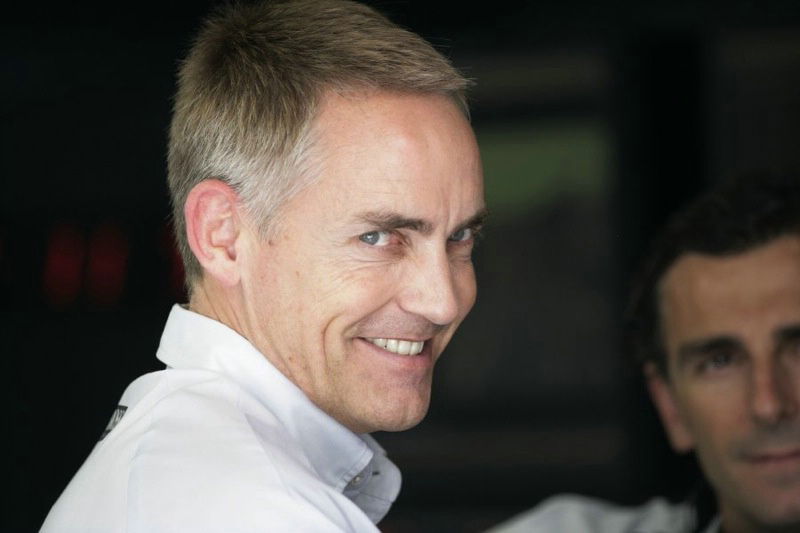Coulthard: Button has put his balls on the line
First Eddie Irvine predicted that he would get 'murdered' for his foolhardy bravado [see separate story - click here], and now David Coulthard has joked that defending F1 World Champion Jenson Button has 'put his balls on the line' in leaving the safe, familiar confines of Brawn GP - now Mercedes Grand Prix - to pit himself quite literally head-to-head against compatriot and title-winning predecessor Lewis Hamilton at McLaren-Mercedes in 2010.
The general consensus within the F1 paddock is that Button was audacious if not altogether suicidal to enter the lion's den as it were in taking on Hamilton in the team that over the past decade or so the Stevenage-born ace has all-but made his own. He won't be able to hold a candle to his younger countryman, the cynics argue - and if he does threaten to steal Hamilton's thunder, he will swiftly be slapped down again and put in his place so that McLaren's favourite son can come out on top.
Whilst not willing to bet one way or the other, Coulthard - a man who in the past has himself been in the position of effective 'number two' at Woking, to Mika Hakkinen from 1997 to 2001, and then to fellow Finn Kimi Raikkonen for the following three seasons - does acknowledge that having finally established himself as a bona fide front-runner with his 2009 title glory, Button has now put his entire reputation at stake should he fail to gain the upper hand.
"Jenson Button is literally putting his balls on the line as the world champion going up against Lewis Hamilton," the Scot eloquently opined, going on to forecast a mouth-watering campaign in prospect. "I don't remember any season as exciting as potentially 2010 will be in F1 - other than maybe when we had a mix of great names like Piquet, Senna, Prost and Mansell.
"We have the comeback of Michael Schumacher at Mercedes, Fernando Alonso at Ferrari, the two Red Bull drivers coming to the fore last year and the all-British line-up at McLaren. I really think it is one of the most exciting seasons we have seen for many years. There are so many great stories to be told during the course of the season, and it's going to be interesting to see how it all develops."
On the subject of former team-mate Raikkonen and the 2007 F1 World Champion's rallying switch, meanwhile, Coulthard let his irreverence take full rein - before using 'The Iceman' as a case in point to illustrate the way in which motor racing is now very different from how it used to be.
"It's just as well he isn't the co-driver having to call the pace notes, because he doesn't say a lot!" the 38-year-old quipped. "What it does show is how motorsport is changing, though. A few years ago drivers tended to stick to one formula, and that was it for their careers. Drivers move around now, like S?bastien Loeb with his F1 test and Le Mans outings. If you are a talented driver, you are talented at driving irrespective of what wheel you are behind."
Raikkonen has been tentatively linked with a return to the top flight in 2011 with Red Bull Racing, but in order for that to materialise the 30-year-old will need to prove that he is a better proposition than the energy drinks-backed outfit's current pairing of Sebastian Vettel and Mark Webber, a talented duo indeed who Coulthard reckons could just lead RBR all the way to world championship triumph in 2010, regardless of the late debut of the Adrian Newey-penned, Renault-powered RB6 following the team's failed Mercedes engine coup.
"Red Bull has great management, a great design squad and a great driver line-up," affirmed the man who competed for the Milton Keynes-based concern during his final four seasons in F1, notching up its maiden podium finish in Monaco and remaining on-board today in a consultancy role. "All the boxes you would want to tick in creating a winning grand prix team I think have been successfully ticked.
"At the end of last season they had the fastest car in F1, and with limited regulation changes going into 2010, they've got to be feeling pretty confident about the year ahead - even if the engine decision has delayed the car's testing debut. Since there are so many standardised parts in F1 today, though, that didn't necessitate as big a redesign as it might have in the past - and it was a strategic decision to spend more time developing the car in the wind tunnel and on the drawing board before committing to the test track.
"You can spend a year testing a slow car, but it will still be a slow car - you've just tested it all year. The 1988 McLaren hardly tested at all before the season - and it went on to win 15 of the 16 races that year. If you have a great package initially, testing is only about making it reliable."







